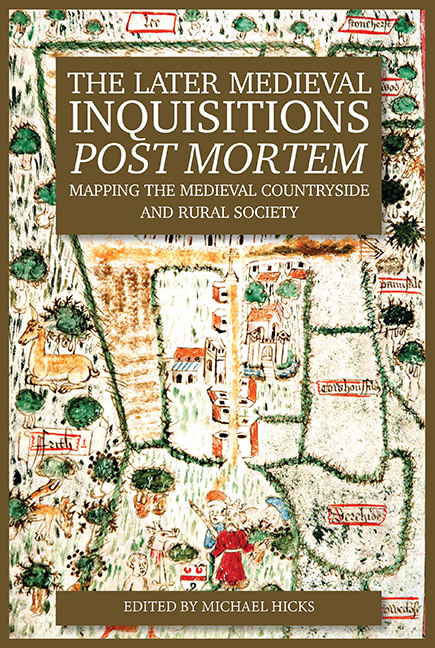Book contents
- Frontmatter
- Contents
- List of Illustrations
- List of Contributors
- Glossary
- List of Abbreviations
- 1 Introduction
- 2 Records of an Imperial Administration? Inquisitions Post Mortem in Scotland and Calais
- 3 Inquisitions Post Mortem in Medieval Ireland
- 4 The Court of the Honour of Clare, 1308–60: Feudal Incidents and Inquisitions
- 5 Landscape, Farming and Society in an English Region: The Inquisitions Post Mortem for the West Midlands, 1250–1509
- 6 Beyond the Dots: Mapping Meaning in the Later Medieval Landscape
- 7 Fairs and Markets in the Inquisitions Post Mortem
- 8 The Structure of the Milling Industry 1427–37
- 9 Proofs of Age 1246 to 1430: Their Nature, Veracity and Use as Sources
- 10 What Went On in the Medieval Parish Church, 1377–1447, with Particular Reference to Churching
- 11 Retainers, Monks and Wine: Three Insights into Everyday Life
- 12 The Administration and Efficiency of the Inquisitions Post Mortem Process: A Case Study of Northumberland
- 13 Late Medieval Land Disputes and the Manipulation of the Inquisitions Post Mortem
- Index
12 - The Administration and Efficiency of the Inquisitions Post Mortem Process: A Case Study of Northumberland
Published online by Cambridge University Press: 26 May 2021
- Frontmatter
- Contents
- List of Illustrations
- List of Contributors
- Glossary
- List of Abbreviations
- 1 Introduction
- 2 Records of an Imperial Administration? Inquisitions Post Mortem in Scotland and Calais
- 3 Inquisitions Post Mortem in Medieval Ireland
- 4 The Court of the Honour of Clare, 1308–60: Feudal Incidents and Inquisitions
- 5 Landscape, Farming and Society in an English Region: The Inquisitions Post Mortem for the West Midlands, 1250–1509
- 6 Beyond the Dots: Mapping Meaning in the Later Medieval Landscape
- 7 Fairs and Markets in the Inquisitions Post Mortem
- 8 The Structure of the Milling Industry 1427–37
- 9 Proofs of Age 1246 to 1430: Their Nature, Veracity and Use as Sources
- 10 What Went On in the Medieval Parish Church, 1377–1447, with Particular Reference to Churching
- 11 Retainers, Monks and Wine: Three Insights into Everyday Life
- 12 The Administration and Efficiency of the Inquisitions Post Mortem Process: A Case Study of Northumberland
- 13 Late Medieval Land Disputes and the Manipulation of the Inquisitions Post Mortem
- Index
Summary
Government in late medieval England was a highly advanced system for its time and one of the most sophisticated in Europe. From its centre at Westminster, the king's command travelled to the most remote areas of his realm. Nevertheless, the government lacked the infrastructure to function independently in the shires. There the operation of government and administration relied on the voluntary participation of the local landed élites. Moreover, Professor Ralph Griffiths has argued, the capacity of English kings was limited by the geography of the kingdom. Much of the realm was too distant, too large, too complex and too expensive to be governed effectively. Historians’ understanding of the government of England's most northerly county has suffered particularly from this notion of remoteness and royal weakness. Yet the county of Northumberland outside the liberties was no different from any other shire in terms of the range of officials who were appointed to protect the king's interests and to manage affairs in his name. Professor Anthony Pollard has explored this subject in relation to key officers in north-eastern England during the second half of the fifteenth century, the period of greatest interest. This chapter takes another perspective on the relationship between periphery and centre by exploring how Northumbrian society interacted with royal administration through the lens of the IPM process. The local officer was the escheator, an office last comprehensively examined more than half a century ago. The distance in geographical miles between Northumberland and Westminster, this paper suggests, is too rudimentary and inadequate a measure. This paper uses the Northumberland IPMs to survey firstly the management of the process at a local level and secondly its interaction with chancery at Westminster. The proofs of age are specifically excluded from discussion.
I
Northumberland's escheators were leading gentry who often acted as sheriffs and justices of the peace. Normally they served for one year only. Exceptions were William Strother of Bolton, who acted for more than four years, taking the place of successive escheators who failed to account, and Robert Rhodes, who was in post for three consecutive years from November 1434 to 1437.
- Type
- Chapter
- Information
- The Later Medieval Inquisitions Post MortemMapping the Medieval Countryside and Rural Society, pp. 193 - 202Publisher: Boydell & BrewerPrint publication year: 2016



